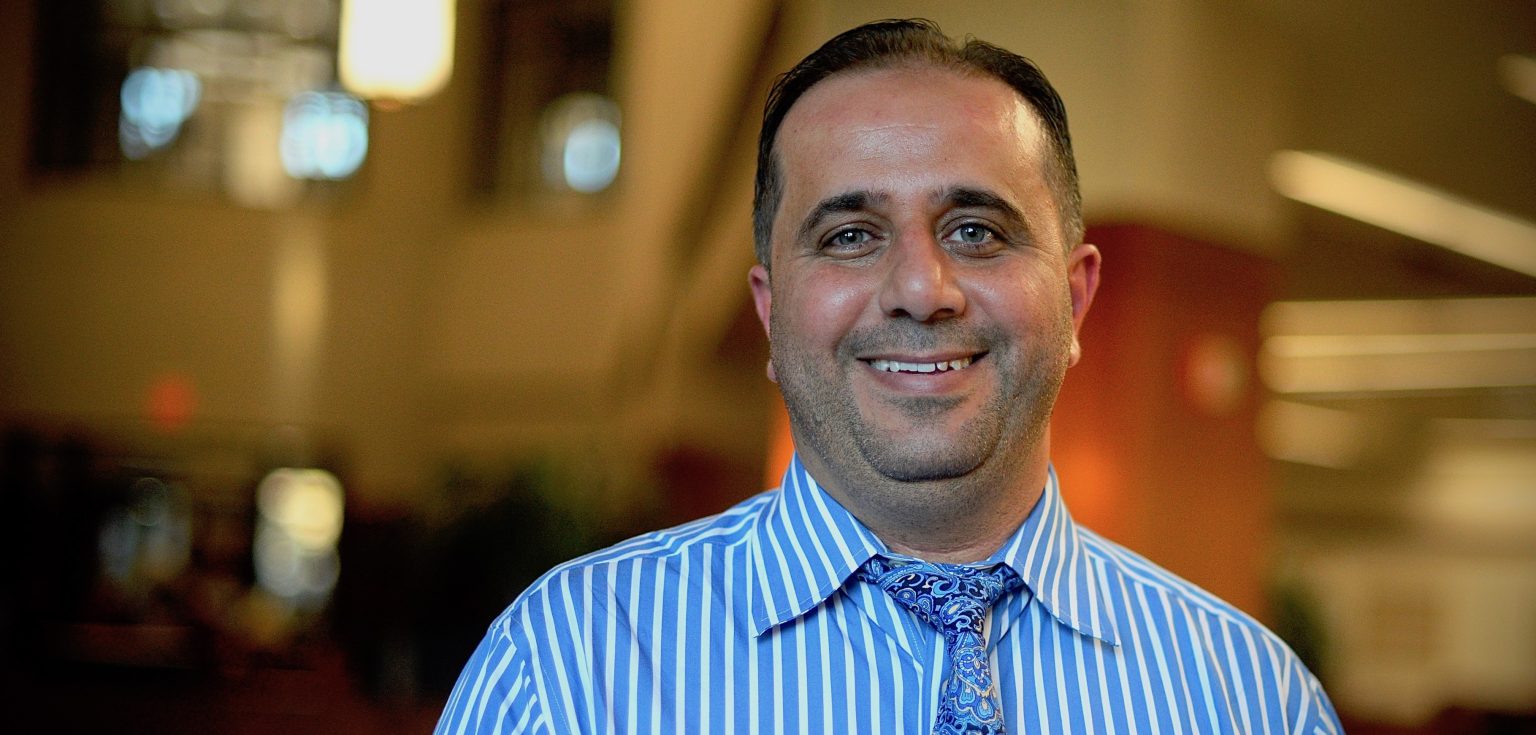Alshorman is the first student in Fordham’s Graduate School of Religion and Religious Education who is also a Muslim imam. Every Tuesday at 5 a.m., he leaves his home in Lake County, Florida. Several hours later, he lands in LaGuardia Airport. From 5 to 9 in the evening, he sits in a Rose Hill classroom and learns about religious education. From 9 at night to 2 in the morning, he studies in the Walsh Library with his 20-pound backpack, loaded with textbooks and snacks. And when the library closes at 2 a.m., he returns to the airport and heads back to Florida, to his full-time job as an Imam at the Islamic Center of South Lake County, and to his wife and their four children.
“It’s tough,” Alshorman said. “But one of my professors at Fordham once told me, ‘Maybe God has chosen you to do this.’”
He explained that Imam means “leader” in Arabic. “To be an imam means you are the leader of your community. You are the leader of your mosque. You are a spiritual leader—a mentor.”
An Evolving View of Islam
Alshorman was born into a Muslim family in Jordan. When he was a teenager, his father suggested that his son become an imam, just like him. Alshorman agreed.
He spent his twenties studying Islam. In the 2000s, he earned a bachelor’s degree in Islamic law, a master’s degree in the Holy Quran, and certification as an imam and Islamic studies teacher in Jordan. In 2014, he received a Ph.D. in Islamic studies from the Graduate Theological Foundation in Mishawaka, Indiana. Today, Alshorman is a 39-year-old imam at the Islamic Center of South Lake County in Clermont, Florida—a post that helps fill the shortage of imams in the U.S.
His years of education have helped him serve as an imam in both his native Jordan and multiple mosques in Florida for the past two decades. But perhaps most importantly, he said, they’ve vastly altered his perception of Islam. He realized what he’d seen growing up didn’t match his now-enlightened interpretation of the Quran. One example is gender segregation. The separation of women and men in mosques is a tradition inherited from the Byzantine empire, he said—not an actual rule in the Quran.
“This is the way we grew up: ‘Islam says this is forbidden,’” Alshorman said. “But when you go deeper, Islam doesn’t say that.”
“This is the reason I keep studying—to teach people real Islam. To teach people what God, or as we say in Arabic, Allah, really wants … There is a difference between religion and habits, cultures, and traditions.”
‘Religion Without Education is Miseducation’
Now Alshorman, a GRE doctoral student in religious education, wants to pass on his knowledge to the next generation of Muslims.
“I believe a religion without education is miseducation,” he said.
Last year, he officially began classes at the Rose Hill campus. One course will help him better nurture the faith of Muslim children and teenagers in his mosque, he said. Another gave him a better understanding of the history of religious education from the biblical and apostolic periods to the present. Now he’s learning how to design a curriculum in religious education.
“When I get back to my community [in Florida], everything I learn here at Fordham—I teach to my community,” Alshorman said.
In Florida, Alshorman is not only an imam, but also a co-founder of the Interfaith Council of Lake County, an organization established three years ago to bring people from all religious backgrounds together—Muslims, Christians, Jews, Unitarian Universalists, Baha’is, and others.
‘Brothers and Sisters’
“[Fordham] teaches me a lot about other religions and to understand other religions,” Alshorman said. “Y’know, I think of them [interfaith council members] as my brothers and sisters. Even when I have a personal occasion, I invite them. And they come.”
Someday, Alshorman wants to be a religious education university professor in the U.S. or Jordan. Part of that stems from his love for the Quran. Some of his favorite parts of the book are the sections on how to speak kindly to people.
“How to be truthful, how to say good words—to speak good with people,” he explained, thumbing through a few Arabic verses on his smartphone.
“[I want to teach people] the right Islam—how to be a true Muslim, how to be a true believer, how to have peace, how to live with every other kind of people,” Alshorman said. “We are human beings. We are brothers and sisters.”

